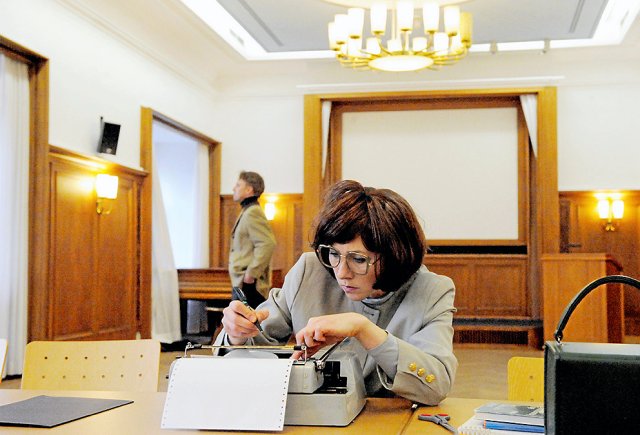This evening, the actors Christian Erdt and Laura Mitzkus are sitting at a large, official desk with a secretive screen, he in a retro-casual poet’s jacket, she in a strict gray party blazer with a skirt.
Photo: Lena Obst
40 years ago the writer Franz Fühmann died in East Berlin. He was 62 years old and colon cancer killed him. Fühmann was one of the best-known authors in the GDR, published poetry, stories, wrote for children, about travel, wrote poetry, and was an essayist. The one big hit, a canonized novel with a final claim to explaining the world, or the one play that can be seen on every stage every few years, is missing. Perhaps this is an aesthetic reason why Fühmann is now only known to a few younger writers. And why it no longer plays a major role, at least in the pan-German literary discourse that West German publishers and newspapers have under control. Another reason may be that Fühmann struggled with the GDR and especially its cultural policy, where he was involved for many years as an academy member and in the writers’ association. Yes, he doubted and hesitated, supported young dissidents, and wanted to be free from the guidelines for his work that were imposed by non-artistically minded officials. But none of that was a reason to go to the West and finally condemn the GDR.
In order to counteract the threat of oblivion and this widespread lack of reception, the research art collective Vajswerk has taken on the poet. Under the title “Franz Fühmann’s Skins,” a one-and-a-half-hour production by Christian Tietz can now be seen in the Berlin Hall of the Berlin Central State Library, which approaches Fühmann’s life and work through documents of a literary and historical nature. You can find out more background information in a four-part podcast. Silas Dörken, the literary scholar Kristin Schulz and the writer and Fühmann translator Isabel Fargo Cole were also involved in the research.
This evening, the actors Christian Erdt and Laura Mitzkus are sitting at a large, official desk with a secretive screen, he in a retro-casual poet’s jacket, she in a strict gray party blazer with a skirt, and under a wig, as it turns out. Obligatory copywriting utensils are spread out on the table. Fühmann’s contradictory life is presented through letters, speeches and poems. Coming from a lower middle class background, Fühmann is seduced by the cult of the leader and becomes a prisoner of war. At the Antifa school he becomes a socialist. He published widely, defending the suppression of the uprising on June 17, 1954 and the construction of the Wall. When Soviet tanks gunned down the Prague Spring, cracks appeared in Fühmann’s self-image and worldview. He remains grateful that he went from being a fascist henchman to being a human because of the Soviet liberators. But he can no longer ignore the fact that an apparatus of apparently experience-resistant gentlemen has no way of dealing with the country’s lively, artistic forces, which write poetry instead of approving.
Vajswerk trusts in the quality of Fühmann’s writing. The actors speak and move according to the text. The poet’s inner life finds expression between youthful enthusiasm for the new Soviet man and the melancholic isolation of the established. Laura Mitzkus reads cold assessments from the highest authorities about Fühmann’s mental state when he begins to live and work in an institution with mentally handicapped people. As Fühmann, Erdt initially gives big speeches. And in the end he can only find the words to describe his state of health: “Sorry; Fuck; can not do anything.”
This soliloquy with two voices shows the great loneliness of a lively mind. It illustrates the conflict between the writer who wants to write honestly, perhaps also has a belief in the eternal poet’s word, and the doubting former model poet of the GDR, for whom the other literary officials are just “scumbags” and who himself has long been an operational process for them had become the Stasi.
Next performances: December 5th, December 6th
Subscribe to the “nd”

Being left is complicated.
We keep track!
With our digital promotional subscription you can read all issues of »nd« digitally (nd.App or nd.Epaper) for little money at home or on the go.
Subscribe now!
link sbobet link sbobet judi bola judi bola online
